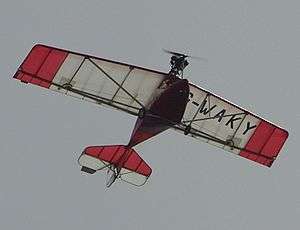Cyclone AX2000
The Cyclone AX2000 is a British built three axis microlight, first flown in the 1990s. It seats two in side-by-side configuration.
| AX2000 | |
|---|---|
 | |
| A HKS 700E powered AX2000 | |
| Role | microlight |
| National origin | United Kingdom |
| Manufacturer | Cyclone Airsports Ltd |
| First flight | c.1997 |
| Number built | at least 29 |
| Developed from | Cyclone AX3 |
Design and development
The AX2000 is a development of the earlier Cyclone AX3,[1] a UK regulation compliant variant of the French Ultralair Premier AX3. This, in turn, was a three axis development of the US Chotia Weedhopper from the early 1980s.[2]
The Cyclone AX2000 is an aluminium tube framed three axis microlight with flying surfaces covered with a polyester fabric with outer PVF lamination (URLAM). The whole aircraft is built around a long, high aluminium keel boom, which bears the engine, wings and empennage. The wing is a two spar structure, with surfaces formed by upper and lower battens rather than ribs. It carries conventional, full span, tapering ailerons but no flaps.[1] The tailplane is mounted on the keel and has an anti-balance/trim tab on the starboard elevator.[1][3] There is a small fixed fin below the keel but none above; the rudder is balanced and extends below the elevators, moving in a cut-out.[3]
The short, deep fuselage is built around a wire braced tube beam. Lift and landing loads are taken by V-shaped, cross braced pairs of lift struts from the bottom of the fuselage to each wing, assisted by a centre line strut to the boom at the wing leading edge. The cockpit enclosure is non-structural, with forward opening doors to a pair of side-by-side seats. These are equipped with separate rudder pedals but the occupants share a central control column. The AX2000 has a tricycle undercarriage mounted close to the fuselage.[1]
The engine is mounted, uncowled, ahead and above the wing leading edge, with the propeller shaft on the boom line. One of three engines may be fitted: a 48 kW (64 hp) Rotax 582/48 or 38 kW (50 hp) 503 2V, both upright twin cylinder two strokes, or the 45 kW (60 hp) HKS 700E (either V3 or Beta variants), flat twin four stroke.[3] Both Rotax engines drive propellers with ground adjustable pitch: the 582 has a three blade, composite propeller and the 503 a two blade wooden one.[1]
As well the new engines, the AX2000 differs chiefly from the AX3 in having a completely double surface wing of reduced area and modified structure, a change of alloy for the main keel beam, a revised and lightened fuselage with new undercarriage, an increased fuel capacity and the addition of an elevator anti-balance trim tab.[1]
The AX2000 is certificated as a glider tug, for gliders of class 1 and 2. A V-shaped forward tow line extension joins the main line to a pair of tug pillars attached to the rear spar on the under surfaces of the AX2000's wing.[1]
Specifications
Data from Civil Aircraft Authority microlight type approval data sheet (TADS) no.BM53 issue 9[3]
General characteristics
- Crew: 2
- Length: 5.60 m (18 ft 4 in)
- Wingspan: 9.10 m (29 ft 10 in)
- Height: 2.10 m (6 ft 11 in)
- Wing area: 15.77 m2 (169.7 sq ft) [1]
- Empty weight: 201 kg (443 lb) notional
- Max takeoff weight: 450 kg (992 lb)
- Fuel capacity: 62 L
Performance
- Maximum speed: 100 km/h (62 mph, 54 kn) manoeuvring
- Stall speed: 58 km/h (36 mph, 31 kn)
- Never exceed speed: 140 km/h (90 mph, 78 kn)
References
| Wikimedia Commons has media related to Cyclone AX2000. |
- "CAA airworthiness approval note - Cyclone AX2000" (PDF). Retrieved 23 August 2011.
- "CAA airworthiness approval note - Cyclone AX3" (PDF). Archived from the original (PDF) on 16 September 2012. Retrieved 23 August 2011.
- "CAA TADS for Cyclone AX2000" (PDF). Archived from the original (PDF) on 5 June 2011. Retrieved 22 August 2011.
- "CAA registrations of Cyclone AX2000". Retrieved 24 August 2011.